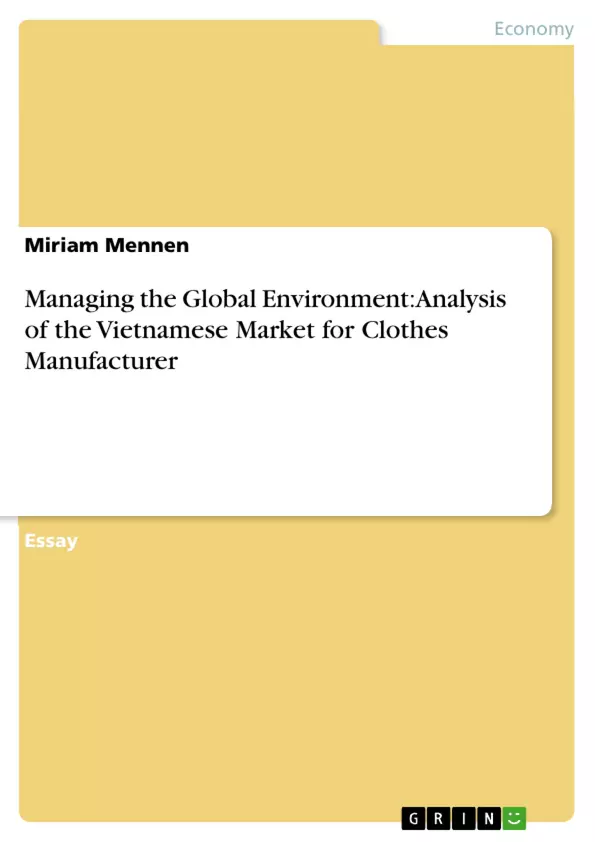Situation: ‘Qubo’, an Italian clothing company, which produces casual wear of medium quality, wants to expand its international operations to Vietnam. The country is, with a population of 84.9 million and a GDP growth rate of 7.1%, an emerging Southeast Asian economy with a high potential of successful foreign trade. (The Economist, 2006, p110) ‘CODE Management consultancy’ was asked to analyse the Vietnamese culture, the environment and ethical issues which might occur in the new location.
In order to successfully expand manufacturing of ‘Qubo’ to Vietnam, the following report will deal with cross-cultural and environmental issues of Vietnam facing the company. Additionally the market will be analysed and possible management challenges as well as ethical issues will be outlined, guaranteeing ‘Qubo’ a successful market entry.
Inhaltsverzeichnis (Table of Contents)
- Situation
- 1. Introduction
- 2. National Culture- Vietnam – Implications on working life
- 3. Macro-Environment of the Vietnamese market.
- 3.1 Recommended Market Entry Strategy
- 4. Ethical and Environmental Issues
- 4.1 Ethical Issues
- 4.2 Impacts of the Vietnam War
- 5. Conclusion and Recommendations
- 6. Bibliography
- Appendix: Code of Conduct
Zielsetzung und Themenschwerpunkte (Objectives and Key Themes)
This report examines the cultural, environmental, and ethical challenges facing 'Qubo', an Italian clothing company, as it expands its operations to Vietnam. The report analyzes the Vietnamese market, considering cultural differences, potential management challenges, and ethical considerations, aiming to provide recommendations for a successful market entry.
- Cultural impact on business operations in Vietnam
- Market analysis and recommended market entry strategy
- Ethical and environmental issues in Vietnam
- Impacts of the Vietnam War on the current environment
- Cross-cultural management considerations for successful expansion
Zusammenfassung der Kapitel (Chapter Summaries)
The report begins by introducing the concept of globalization and its impact on businesses, highlighting the growing importance of cultural considerations in an interconnected world. It then delves into the national culture of Vietnam, focusing on Hofstede's cultural dimensions and their implications for working life in Vietnam. The chapter explores the impact of Vietnam's collectivist culture and high power distance on management styles and communication dynamics. The following chapter analyzes the macro-environment of the Vietnamese market, considering economic factors, market potential, and opportunities for foreign trade. The report examines ethical and environmental concerns that 'Qubo' might encounter, focusing on the legacy of the Vietnam War and its impact on the current environment.
Schlüsselwörter (Keywords)
The report focuses on cultural dimensions, globalization, international business, market entry strategies, Vietnam, ethical considerations, environmental impact, cultural adaptation, and cross-cultural management.
Frequently Asked Questions
What is the potential of the Vietnamese market for clothing manufacturers?
With a population of nearly 85 million and high GDP growth, Vietnam is an emerging economy with significant potential for foreign casual wear brands.
Which cultural dimensions are important for business in Vietnam?
The report analyzes Vietnam's national culture using Hofstede's dimensions, emphasizing high power distance and collectivism.
What are the ethical challenges when expanding to Vietnam?
Key issues include labor standards, environmental impacts of the manufacturing process, and the historical legacy of the Vietnam War.
How does collectivism affect management styles in Vietnam?
Management must account for group harmony and different communication dynamics compared to individualistic Western cultures.
What entry strategy is recommended for 'Qubo' in Vietnam?
The report outlines specific market entry strategies tailored to the macro-environment and cultural context of the Vietnamese clothing sector.
- Quote paper
- Miriam Mennen (Author), 2006, Managing the Global Environment: Analysis of the Vietnamese Market for Clothes Manufacturer , Munich, GRIN Verlag, https://www.grin.com/document/145499



